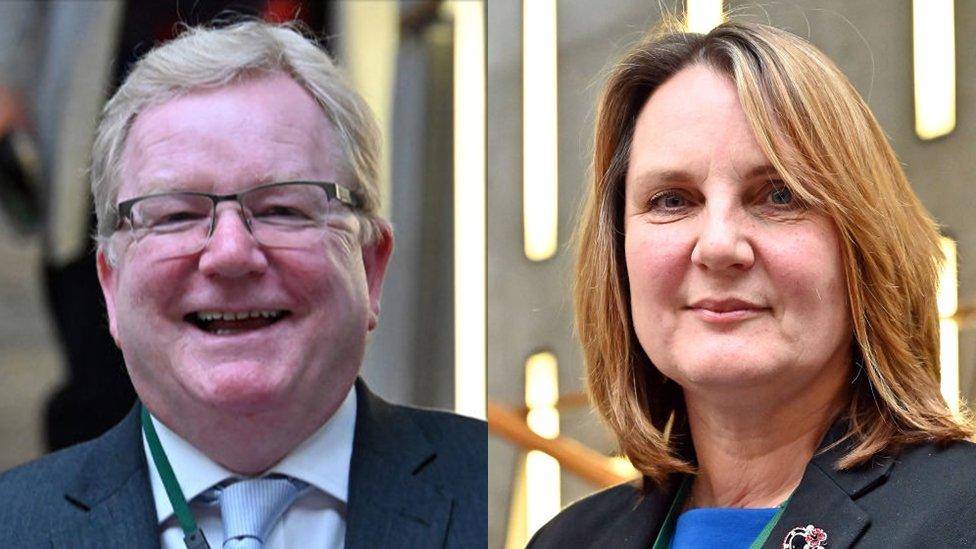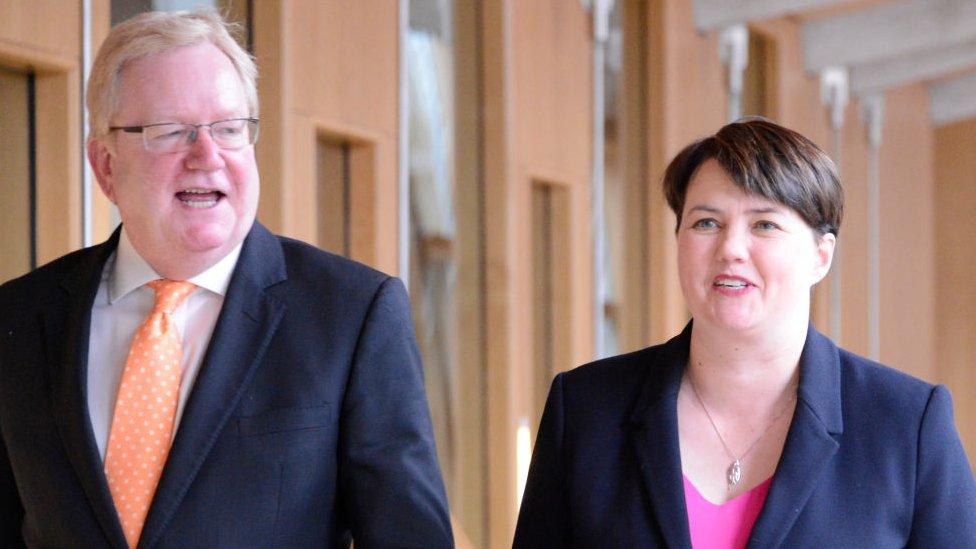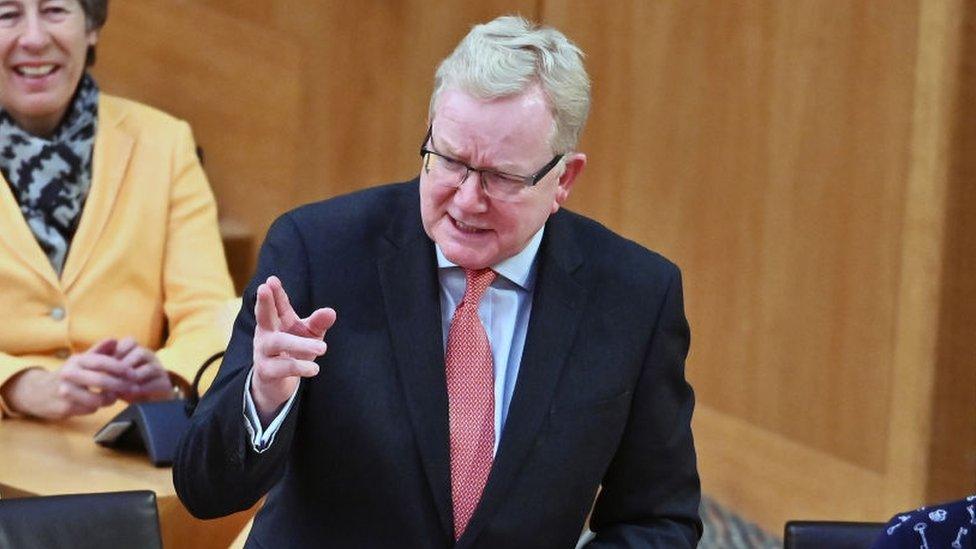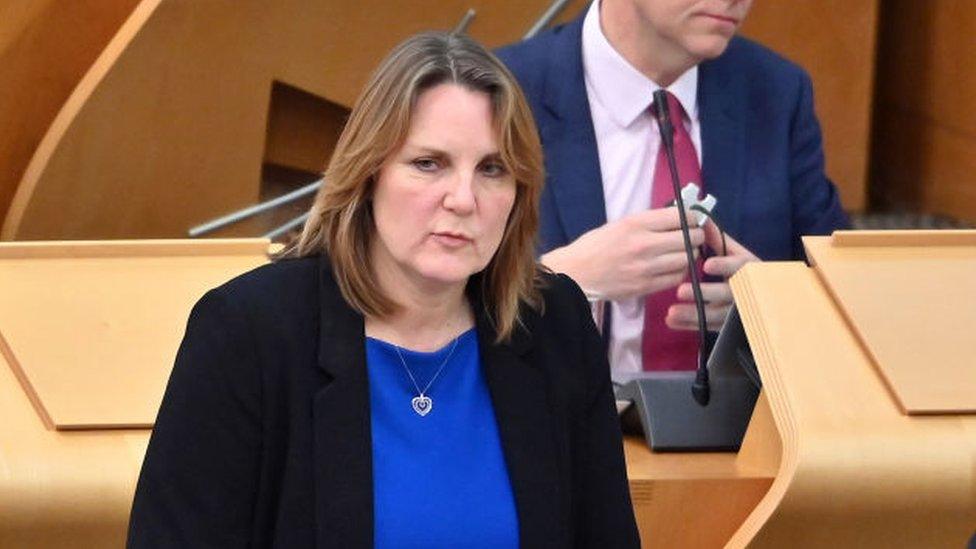Scottish Conservatives: Carlaw and Ballantyne to contest party leadership
- Published

The winner of the contest between Mr Carlaw and Ms Ballantyne will be announced on 14 February
Jackson Carlaw and Michelle Ballantyne have been confirmed as the only two candidates to succeed Ruth Davidson as Scottish Conservative leader.
Mr Carlaw, who has been interim leader since Ms Davidson's resignation in August, is the clear favourite to win the contest.
He has the backing of the vast majority of the party's MSPs and MPs.
But Ms Ballantyne says she is concentrating on winning support from grassroots members.
Allow X content?
This article contains content provided by X. We ask for your permission before anything is loaded, as they may be using cookies and other technologies. You may want to read X’s cookie policy, external and privacy policy, external before accepting. To view this content choose ‘accept and continue’.
Candidates had until 17:00 on Friday to put their names forward, with the winner to be announced on 14 February after a ballot of Scottish Conservative party members.
Who are the candidates?

Mr Carlaw has been the party's interim leader since Ms Davidson quit in August
Jackson Carlaw worked as a car salesman in the west of Scotland for 25 years before being elected as an MSP, but has been involved in politics since joining the Conservatives as teenager in the late 1970s.
He first stood as a candidate in the 1982 Queen's Park by-election, and after several other unsuccessful attempts was eventually elected as a list MSP for the West of Scotland region in the 2007 and again in 2011 - when he also became Ruth Davidson's deputy leader.
Mr Carlaw, who is married with two children, was elected as the MSP for Eastwood in 2016, and served as acting leader when Ms Davidson went on maternity leave ahead of the birth of her son in May of last year.
When Ms Davidson resigned as party leader in August, Mr Carlaw was immediately appointed as interim leader - with some of his supporters hoping he would be given the role on a permanent basis without a leadership contest being required.

The Eastwood MSP has faced Nicola Sturgeon at first minister's questions every week while serving as interim leader
The 60-year-old says he wants the party to appeal to "middle Scotland" ahead of next year's Scottish Parliament election, when he says his goal is to "take down" Nicola Sturgeon and the SNP.
Among his key policy proposals are increasing the number of teachers in Scotland by 2,000, bringing income taxes into line with the rest of the UK, and scrapping the Scottish government's plan to introduce a so-called parking tax.
He told his official campaign launch earlier this week that he stands for "a decent, generous-spirited, 'aspirational conservatism' that promotes the values and ambitions of middle Scotland".
Mr Carlaw has already secured support from a majority of MSPs, all of the Conservative Party's local council leaders in Scotland and some MPs.
He says the experience he has built up in his lengthy stint as acting leader - which saw him go head-to-head with Ms Sturgeon during first minister's questions every week - mean he would be able to hit the ground running if he wins the race to do the job full time.
But critics point out that Mr Carlaw's tenure included last month's general election, when the Scottish Conservatives lost seven of the 13 seats they had won under Ms Davidson in 2017 despite the Tories winning a majority across the UK as a whole.


Ms Ballantyne is the Tory social security spokeswoman in the Scottish Parliament
Michelle Ballantyne started her career as a staff nurse at an NHS intensive care unit in London before moving into health service management.
She moved to the Scottish Borders with her husband, a former paratrooper, in 1990 to raise their six children - with the couple starting a business in Walkerburn that continues to make and sell die-cast models.
Ms Ballantyne continued to work as a nurse before becoming the head of a charity that provided specialist drug and alcohol support to children, families and offenders.
She was elected to Scottish Borders council in 2012, before becoming a list MSP for the South of Scotland region May 2017. She is currently the party's communities and social security spokeswoman at Holyrood.
In 2018 she sparked controversy after telling the Parliament that "people on benefit cannot have as many children as they like while people who work and pay their way and don't claim benefits have to make decisions about the number of children they can have".

Her family owns a factory in the Borders that makes die-cast models, including these military figures
She defended the remarks in an interview with BBC Scotland earlier this month by saying: "What I said is that we need a level playing field. So people who are in work need to have the same opportunities as people who aren't in work."
Ms Ballantyne's most high profile supporter so far has been the former Aberdeen South MP Ross Thomson, who stood down in November to fight allegations that he sexually assaulted a Labour MP in a Commons bar.
She says she is standing against Mr Carlaw because the party needs to have a proper debate about its future rather than merely crowning him unopposed as Ms Davidson's successor.
And she believes the Scottish Conservatives have failed to communicate their policies properly to ordinary people in the past.
Ms Ballantyne says she wants to create a Scotland that "works for working people" by having a fair taxation system, a justice system that puts the rights of victims first and schools that provide aspiration to all pupils, regardless of their background.